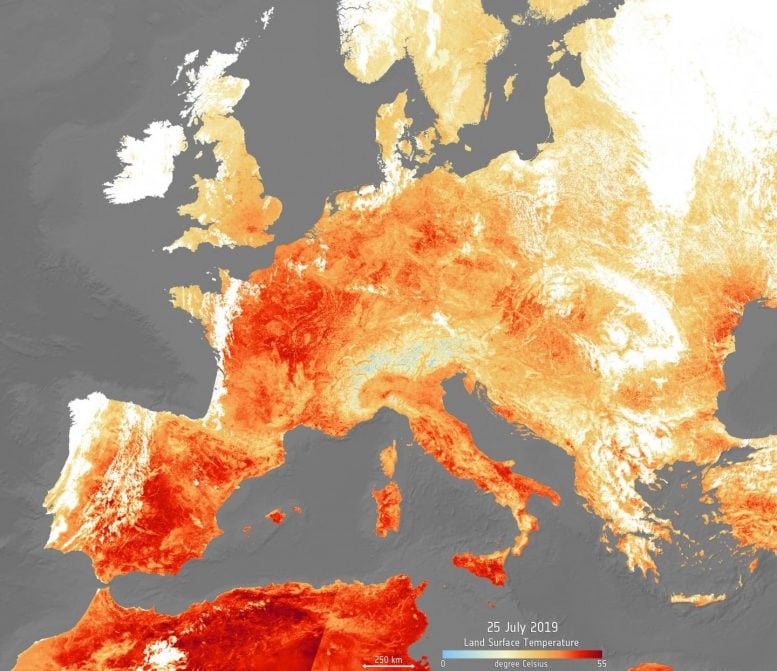
Climate change is increasing the number of days of extreme heat and decreasing the number of days of extreme cold in Europe, posing a risk for residents in the coming decades, according to a new study.
Temperatures in Europe have hit record highs this summer, passing 46.0 degrees Celsius (114.8 degrees Fahrenheit) in southern France. New research in the AGU journal Geophysical Research Letters finds the number of summer days with extreme heat has tripled since 1950 and summers have become hotter overall, while the number of winter days with extreme cold decreased in frequency by at least half and winters have become warmer overall.
The new study finds parts of Europe are warming faster than climate models project.
“Even at this regional scale over Europe, we can see that these trends are much larger than what we would expect from natural variability. That’s really a signal from climate change,” said Ruth Lorenz, a climate scientist at the Swiss Federal Institute of Technology in Zurich, Switzerland, and lead author of the new study.
Extreme heat is dangerous because it stresses the human body, potentially leading to heat exhaustion or heat stroke. Scientists knew climate change was warming Europe, but they mostly studied long-term changes in extreme temperatures. The new study looked at observational data to evaluate whether the climate models used for regional projections can reproduce observed trends.
In the new study, Lorenz and her colleagues used observational data taken by European weather stations from 1950-2018 and then analyzed the top 1% of the hottest heat extremes and highest humidity extremes, and the top 1% of coldest days during that period.
“We looked further at the hottest day or coldest night per year, so for each year we looked for the maximum/minimum value and how these changed over time,” Lorenz said.
They found the number of extremely hot days in Europe has tripled since 1950, while the number of extremely cold days decreased by factors of two or three depending on the region. Extremely hot days have become hotter by an average of 2.30 degrees Celsius (4.14 degrees Fahrenheit), while extremely cold days have warmed by 3.0 degrees Celsius (5.4 degrees Fahrenheit) on average. The hottest days and coldest nights warmed significantly more than their corresponding summer and winter mean temperatures.
Individual regions throughout Europe experienced drastically different temperature trends, which makes it difficult to compare the average European temperatures to specific stations’ extremes, according to the authors. In Central Europe, the extremes warmed by 0.14 degrees Celsius (0.25 degrees Fahrenheit) per decade more than the summer mean, equivalent to an almost 1.0 degree Celsius (1.8 degrees Fahrenheit) increase more than the average over the whole study period, according to Lorenz.
More than 90% of the weather stations studied showed the climate was warming, a percentage too high to purely be from natural climate variability, according to the researchers.
The results also showed that the region was warming faster than climate models projected. Some regions experienced higher extremes than expected and some had lower extremes than expected.
“In the Netherlands, Belgium, and France, the model trends are about two times lower than the observed trends,” said Geert Jan van Oldenborgh, a climate analyst at the Royal Netherlands Meteorological Institute in De Bilt, Netherlands, who was not connected to the new study. “We’re reaching new records faster than you’d expect.”
European summers and winters will only grow hotter in the coming years as climate change accelerates, impacting cities and people unprepared for rising temperatures, according to the study authors.
“Lots of people don’t have air conditioning for instance and it makes this really important,” Lorenz said. “We expected results based on modeling studies but it’s the first time we see it in what we’ve observed so far.”
Reference: “Detection of a Climate Change Signal in Extreme Heat, Heat Stress, and Cold in Europe From Observations” by Ruth Lorenz, Zélie Stalhandske and Erich M. Fischer, 17 July 2019, Geophysical Research Letters.
DOI: 10.1029/2019GL082062
Never miss a breakthrough: Join the SciTechDaily newsletter.
3 Comments
You’re kidding, right? Climate change is warming Europe? Wonder what tune you’d be playing if the Gulf Stream decided to change direction. I suppose that would be blamed on mankind as well, right? If humanity possesses the means to alter climate, intentionally or not, this wouldn’t even be a blip on the radar of historical climate records. Hoe arrogant to believe that man has the means to affect global anything. One hot Summer does not make a trend. A consistently hot decade might be, but considering the fluctuations even one volcano can introduce on a decade, remember Mt Pinatubo? It isn’t time to panic because a warm Summer blessed a region that is historically cooler and only temperate because of an ocean current. But I suppose when a cold Winter comes along within the next decade, that too can be blamed on Man’s interference.
Ok, we get it, you don’t believe in climate change, because you know everything. But next time, at least read the article…
Not to mention the increasing migration of pathogens from the Mediterranean regions to northern Europe such as malaria.